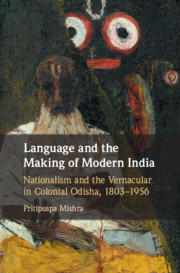Language and the Making of Modern India
Through an examination of the creation of the first linguistically organized province in India, Odisha, Pritipuspa Mishra explores the ways regional languages came to serve as the most acceptable registers of difference in post-colonial India. She argues that rather than disrupting the rise and spread of all-India nationalism, regional linguistic nationalism enabled and deepened the reach of nationalism in provincial India. Yet this positive narrative of the resolution of Indian multilingualism ignores the cost of linguistic division. Examining the case of the Adivasis of Odisha, Mishra shows how regional languages in India have come to occupy a curiously hegemonic position. Her study pushes us to rethink our understanding of the vernacular in India as a powerless medium and acknowledges the institutional power of language, contributing to global debates about linguistic justice and the governance of multilingualism. This title is also available as Open Access.
Pritipuspa Mishra is a Lecturer in History at the University of Southampton.



